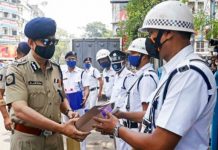 Dear Readers,
Dear Readers,
Beijing police have recently started using smart glasses which are geared with AI (Artificial Intelligence). It helps them to them to pick up registration plates of vehicles and match them in real-time with the database of suspects. A two-day global conclave was held in Delhi in March to discuss “policing challenges in 2020”. A gamut of speakers touched upon some of the very crucial issues including the “emerging trend of AI” in analysing data to fight crime and terrorism. Police chiefs of Asia Pacific countries were also present at the milieu.
Indian police forces are standing at a very crucial juncture and they are locking horns with bigger and mightier enemies by overshadowing the infrastructural and socio-economic challenges.
Understandably so, use of maximum technology in policing could change the law-enforcement climate of the country. Observers and experts believe that the apt implementation of AI (Artificial Intelligence) would change the future course of policing in India. Several countries across the world have already started reaping the benefits of AI by inducting this smart technology within the law enforcement skeleton. AI can cork criminal activities by identifying crime before it happens. A recent report revealed that Cortica, an Israeli company with deep roots in security and AI research, recently formed a partnership in India with Best Group to analyze the terabytes of data streaming from CCTV cameras in public areas. One of the goals is to improve safety in public places, such as city streets, bus stops, and train stations.
Some of the top homeland security experts believe that the challenges of policing in India are severe as the nature of policing here changes with nature, climate, lifestyle, the social and economic status of the denizens they serve.
Men, women in uniform in India are fighting issues like radicalisation, counter-terrorism and terrorist financing.
Albeit AI has emerged as the most effective tool to fight crime and terrorism but the pool of data produced by the law and enforcement agencies are of no use when it comes to predictive policing.
A leading English daily printed a statement of Dr Partha Pratim Talukdar, assistant professor, department of computer science, IISC Bangalore where he said that AI will aggregate critical threat data into actionable intelligence by creating a common framework and format this data to be effectively analysed by human investigators and learning machines. This will also overcome format inconsistencies and relieve the investigators of the task of decoding and reformat the data before any effective analysis can begin, the session discussed. AI should be used with proper data protection safeguards.
I believe, that to overcome the future roadblocks of policing the entire fraternity of cops spread across the globe must work as a family and must erect smart and edgy information sharing mechanism without which it would be extremely hard for any nation to address the challenges of new age policing.
Happy Reading
Satya Swaroop
Managing Editor
satya@newmediacomm.biz













